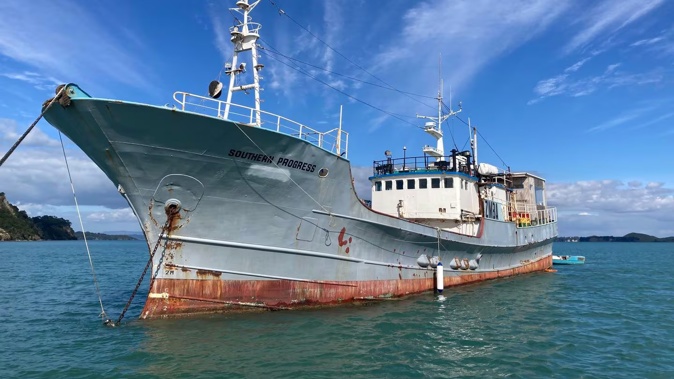
Rusting away in Rangitoto’s Islington Bay is the end of a dream. The 35m vessel, Southern Progress, once used to deliver medical aid to Pacific island villages, is about to be towed away, and sold off for scrap metal.
To Auckland’s Harbourmaster, Andrew Hayton, Southern Progress represents a $150,000 headache, the estimated cost to dispose of a 130-tonne steel boat.
To some of the young women who once crewed on the grey hulk, it will be a fitting end. The vessel represents memories they’d rather bury at sea.
Once owned by self-styled philanthropist Craig Koning, Southern Progress turned into something of a floating harem over a two-year period that the former Japanese fishing vessel served as a workhorse for Koning’s charity, the Floating Foundation charity. He set up the charity in 2017 with the aim of delivering medical aid and education to remote villages in Fiji, Tonga and Vanuatu.
During Koning’s ownership, Southern Progress became something of a fixture at Karaka Bay in Glendowie, Auckland. The ship was often lit up at night, its generator going, with the occasional party on board.
But in 2018 Koning was the subject of media scrutiny when several women who crewed on the expeditions claimed he behaved inappropriately, got drunk, was verbally and psychologically abusive, and abused his position of power to seduce young women employed as crew.
Craig Koning, who once owned the vessel Southern Progress, was jailed for rape.
That publicity in the Sunday Star-Times raised an even more serious accusation against Koning when a former girlfriend, Amy Coronakes, accused him of rape.
Koning was found guilty of two rape charges in 2020 and sentenced to five years in prison. The charges related to an incident in 2004 when, aged 19, he was dating Coronakes. At Koning’s sentencing in April 2021, Coronakes, who waived her right to automatic name suppression, appeared in an audio link from Australia, calling Koning a “complete and utter coward” who preyed on and used vulnerable young women.
“After reading the article, I knew I had to come forward”, she told the court.
After he was found guilty, Koning sold Southern Progress which has been anchored in Islington Bay for the past four years. Hayton said the current owner lived overseas and at this stage it was doubtful he would contribute to the cost of disposing of the vessel.
“We will keep persevering.”
Coning was released from prison in 2022 under special parole conditions. The Herald was unable to contact him.
Abandoned boats are a global problem
Southern Progress isn’t the only floating headache the Auckland harbourmaster faces. His team dispose of between 30 to 35 abandoned boats every year, up from around four a year when Hayton took up the role 13 years ago. It costs between $150,000 and $170,000 a year to get rid of the boats — and Southern Progress will be an additional $150,000 to that cost this year.
Another 200 decaying boats are on a watch list. The cost of dealing with them was an issue that every harbourmaster in New Zealand faced, a problem that was increasing globally every year, Hayton said.
/cloudfront-ap-southeast-2.images.arcpublishing.com/nzme/MOBCXVLHQBEILBC7BCSEPZ3Z24.jpg)
Auckland Harbourmaster Andrew Hayton is tasked with disposing of abandoned vessels, including the 35m Southern Progress.
Owners receive plenty of warning. A sticker is placed on the vessel asking the owner to contact the Harbourmaster’s office. If there’s no response, a notice declaring it abandoned is put on the vessel. The names and locations of abandoned boats are also listed in newspaper public notices columns. The latest list of 12 abandoned boats in the NZ Herald includes six moored in Putiki Bay, Waiheke Island, a popular spot for the liveaboard community.
Hayton said attempts were made to recoup the cost of disposal from the boat’s owner but that was often difficult.
The usual scenario for those who bought ageing boats was that the vessel seemed like a good deal. However, the new owners were often not aware of the costs involved in maintaining a vessel, particularly one the size of Southern Progress.
“People’s dream gets in the way of reality. The dream turns into a nightmare and the costs just mount up.”
Smaller boats in poor condition would change hands for a few hundred dollars but maintenance costs were considerably more.
“A lot of the time it’s cheaper to abandon it, say you’ve never owned it or say you’ve sold it to someone else and just go and buy another boat.”
The rusting hull of Southern Progress, currently anchored in Islington Bay, Rangitoto, and due to be demolished.
Southern Progress was now too far gone to bring back to any level of seaworthiness. His team had removed 2000 litres of used oil stored in rusting drums and containers on deck in readiness for the tow.
“Her time’s up.”
One of the issues with many of the abandoned vessels was tracing the owners, Hayton said. Boats do not need to be registered in New Zealand, unlike some states in Australia.
The cost of setting up a system to register boats would be significant. In Auckland alone, there were more than 100,000 boats.
“People aren’t used to paying to register their boats so it’s not going to go down well.”
Take your Radio, Podcasts and Music with you

/cloudfront-ap-southeast-2.images.arcpublishing.com/nzme/7MFOMK5XGZBQ5PTRUDB4O2SABM.JPG)
/cloudfront-ap-southeast-2.images.arcpublishing.com/nzme/T7SOWFHXDFFXBM2TSJNGOG2IZM.JPG)








